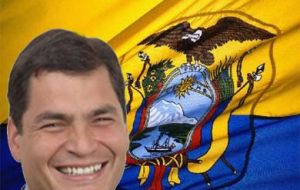MercoPress. South Atlantic News Agency
Landslide victory in Ecuador for XXI Century Socialist project
 Pte. Correa tells Congress to “Go Home”
Pte. Correa tells Congress to “Go Home” Ecuadorian president Rafael Correa received a landslide support in the Sunday election for a Constitutional Assembly which will be tasked with reforming the country's constitution and leading it towards what he has defined as XXI Century Socialism.
Although vote counting is painfully slow, according to exit polls Correa's political movement Alianza Pais apparently will hold somewhere between 76 and 80 seats of the Assembly's 130 member enabling him to work, in alliance with smaller groups with a comfortable majority. Correa was quick to call it an "unquestionable victory, results are overwhelming" and from the presidential palace of Carondelet in the capital Quito announced the "Ecuadorian people have won the mother of all battles". He also ratified what he had anticipated all along the campaign leading to Sunday's voting: he will give up his presidential post to the Constitutional Assembly and at the same time request Congress, currently under opposition control, to be dissolved. This is Correa's third electoral victory in less than a year: he was elected to office last January running as an independent, non establishment candidate with no political party behind; in April he forced a vote on convening a Constitutional Assembly which took place Sunday and once the sweeping reforms to the constitution are completed another referendum will he held. "The triumph of Alianza País reflects the collapse of the old structure of power in Ecuador", said political analyst Felipe Burbano. "The citizens today handed total power to President Correa," said Mauricio Pinto, a former president of Quito's Chamber of Commerce and a candidate to the assembly from the centrist Christian Democratic Party. Since democracy was restored in 1979, Ecuadorian politics has been marked by almost constant conflict between the executive and a unicameral, fragmented legislature, and in the last ten years several elected presidents have been ousted or were unable to complete their mandate. Talking to foreign correspondents President Correa said that once the new constitution becomes effective he will be calling elections for president, vice-president and a new Congress. During the eight months life of the Constitutional Assembly a "legislative committee" will replace Congress and draft "ten, twelve basic bills". Correa has called on other political forces to participate in the re-foundation of Ecuador but from the very beginning excluded the runner ups in Sunday's election. One of the groups is led by a former president and Army Colonel Lucio Gutierrez and the other by the country's richest man and banana tycoon Alvaro Noboa, since they represent "corruption and national disaster". Anyhow the Sunday election gives Correa unprecedented power in the oil-rich Andean country and there are growing fears among the local business community and foreign investors that the 44 year old US educated economist may seek to centralize power in a similar vein to President Hugo Chávez of Venezuela with whom he has a close and fluid relation. However Correa has denied having any hidden agenda. "Our constitution will not follow the Venezuelan model" he said. "We're interested in principles not models, besides every country must decide according to its own different realities". Regarding economic policy the new constitution will "facilitate" foreign investment particularly in banking "to force competition". As to the foreign debt Correa recalled that Ecuador is already negotiating re-scheduling with creditors and a similar process is on track with oil and mining companies to increase royalties and improve contract conditions for the Ecuadorian state. "We will probably renegotiate debt using market instruments, buying back more expenses debt in exchange for cheaper debt" he said adding that he planned to keep the US dollar as the country's official currency during his government. But the end of the 1998 constitution will signal the elimination of the current neo-liberal system and "the recovery of the government's planning capacity", underlined Correa. "This means the beginning of the concept of a solidarity system". Analysts also point out that contrary to what has happened in Bolivia where negotiations in the constitutional assembly are stalled and at time violent because a two thirds majority is needed to approve reforms, in Ecuador it's absolute majority, half plus one votes. Nevertheless according to Felipe Burbano the main risk in the coming months comes from Alianza País's strength in the assembly. The heterogeneous nature of Ecuadorian society means that "political majorities in Ecuador are circumstantial", he said, and can easily dissolve into opposition. There is also no guarantee that Ecuador's sitting congress will accept the reforms, or even agree to dissolve and be replaced by the constitutional assembly.




Top Comments
Disclaimer & comment rulesCommenting for this story is now closed.
If you have a Facebook account, become a fan and comment on our Facebook Page!